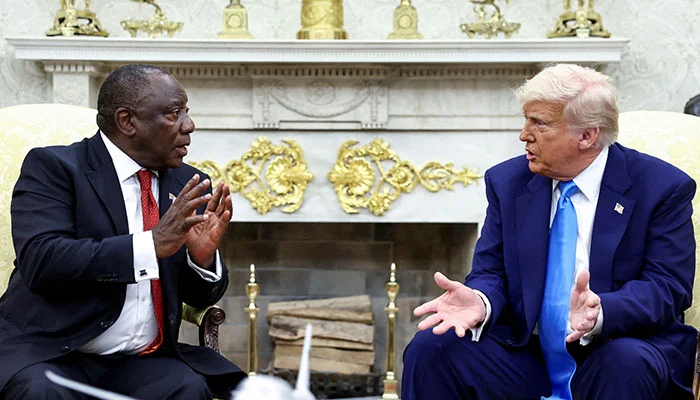On Wednesday, U.S. President Donald Trump confronted South African President Cyril Ramaphosa at the White House with allegations of mass killings and land seizures from white people, in a scene that echoed his February ambush of Ukraine’s Volodymyr Zelenskiy.
South Africa vehemently rejects the allegation that white people are disproportionately targeted by crime. While murder rates are high in the country, the overwhelming majority of victims are Black.
Ramaphosa arrived stating his intention to discuss trade and critical minerals, and the meeting began cordially with exchanges about golf between him and Trump. Champion South African golfers Ernie Els and Retief Goosen were present as part of Ramaphosa’s delegation.
However, the televised Oval Office meeting quickly took a different turn, with Trump presenting a video and printed articles purporting to offer evidence to support his unfounded claims that white South Africans are being persecuted.
“People are fleeing South Africa for their own safety. Their land is being confiscated, and in many cases, they’re being killed,” Trump asserted in one of a series of accusations.
South Africa, which endured centuries of draconian discrimination against Black people during colonialism and apartheid before becoming a multi-party democracy in 1994 under Nelson Mandela, rejects Trump’s allegations.
A new land reform law, aimed at redressing the injustices of apartheid, allows for expropriations without compensation when in the public interest, for example, if land is lying fallow. No such expropriation has taken place, and any order can be challenged in court.
The video displayed by Trump showed white crosses, which he claimed were the graves of thousands of white people, and featured opposition leaders making incendiary speeches. Trump suggested that one of them, Julius Malema, should be arrested.
Ramaphosa largely remained expressionless while the video played, occasionally craning his neck to view it. He stated that he had not seen it before and wished to ascertain its location.
Trump then presented printed copies of articles that he claimed showed white South Africans who had been killed, repeating “death, death” as he flipped through them.
Ramaphosa acknowledged the prevalence of crime in South Africa and reiterated that the majority of victims were Black. Trump interrupted him, stating: “The farmers are not Black.”
Ramaphosa responded: “These are concerns we are willing to talk to you about.”
The South African leader maintained his composure throughout the encounter.
In recent months, Trump has criticized the land reform law and South Africa’s genocide court case against Israel.
He has canceled aid, expelled South Africa’s ambassador, and offered refuge to white minority Afrikaners based on racial discrimination claims that Pretoria deems baseless.
The U.S. is South Africa’s second-largest bilateral trading partner after China. However, South Africa is currently facing a 30% tariff under Trump’s presently suspended ‘Liberation Day’ regime, and Ramaphosa was keen to discuss a trade deal and business opportunities.
Later in the meeting, South African business tycoon Johann Rupert, who was part of Ramaphosa’s delegation, stepped in to support Ramaphosa, stating that crime was a pervasive problem affecting all groups and that many Black people were also dying.
He nodded to Elon Musk, Trump’s South Africa-born billionaire ally who was also present in the Oval Office, suggesting that Musk’s Starlink telecommunications systems were needed in every South African police station to combat crime effectively.
Land Ownership Statistics in South Africa (as of 2017, based on the most recent official data widely available):
- White individuals: Constitute approximately 8% of South Africa’s population. As of 2017, they owned 72% of private agricultural land. (Source: South African government’s 2017 Land Audit)
- Black individuals: Constitute approximately 80% of South Africa’s population. As of 2017, they owned 4% of private agricultural land. (Source: South African government’s 2017 Land Audit)
- The remaining land is held by the government, trusts, or other groups.
- In 2018, the South African Parliament passed a motion to amend the constitution to allow for land expropriation without compensation, with the aim of redressing historical injustices from the colonial and apartheid eras. However, as noted in the report, no such expropriation has actually taken place yet.



